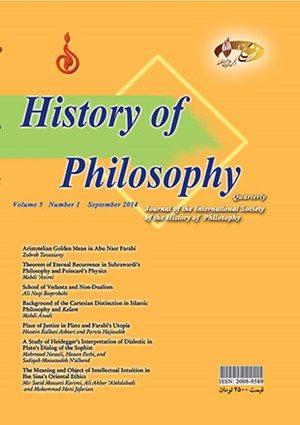School of Vedanta and Non-Dualism
Subject Areas : . New findings about philosophical figures and schools of Iran and the world of Islam
1 - دانشگاه بين¬المللي امام خميني (ره) قزوين
Keywords: Vedanta School of philosophy non-dualism Shankara Upanishads Ramanuja ,
Abstract :
Vedanta is the most original Indian philosophical school which has borrowed its basic principles from Upanishads and emphasizes non-dualism. Indian historians have divided the history of this school into three periods: Pre-Shankara, Shankara, and Post-Shankara. In the first period, some figures such as Badarayana and Gaudapada emerged and laid the foundation for Vedanta philosophy. In the second period, Shankara expanded this school and played a significant role in spreading and disseminating it. During the third period, Ramanuja presented a different interpretation of non-dualism and the notion of Ultimate Reality based on his own critical views and pushed the borderlines of this school even further. Generally speaking, each of the founders and interpreters of Vedanta philosophy explained and expanded this school based on their own philosophical tastes and views and tried to enrich it more than ever before. However, the important point here is that all of them were unanimous regarding the notion of non-dualism. Of course, they had some serious disagreements concerning certain issues, which can also be seen among their advocates. Some of the contemporary Indian thinkers, such as Rabindranath Tagore tried to reconcile their ideas with each other in some way. Vedanta has also influenced contemporary Indian philosophers and artists to such a great extent that their worldview has been completely affected by this school. In the present paper, the writer traces the historical development of the school of Vedanta and explores its relationship with non-dualism.
شايگان، داريوش، اديان و مکتبهاي فلسفي هند، تهران، انتشارات اميرکبير، ج2، 1356. #
چاترجي، ساتيش چاندرا؛ داتا، دريندرا موهان، معرفي مکتبهاي فلسفي هند، ترجمه فرناز ناظرزاده کرماني، قم، انتشارات مرکز مطالعات و تحقيقات اديان و مذاهب، 1384. #
Dasgupta, S., A History of Indian Philosophy, New Delhi, Motilal Banarsidas Publishers, 2000. #
Radhakrishna, S., Indian Philosophy, New Delhi, Blackie & Son Publishers PVT. LTD, 1983. #
Raju, P.T., Structural Depths of Indian Thought, New Delhi, South Asian Publishers, 1983. #
Sharma, C.D., A Critical Survey of Indian Philosophy, New Delhi, Motilal -Banarsidas Publishers, 1983. #
Vatsyayn, Indian Philosophy, New Delhi, Kedar Nath Ram Nath, 1983. #
Hastings, James (ed.), Encyclopedia of Religion and Ethics, Charles Scribner’s Sons, T. &T. Clark, 1981. #
Cush, Denise, Encyclopedia of Hinduism, Routledge Publications, London, 2008. #


